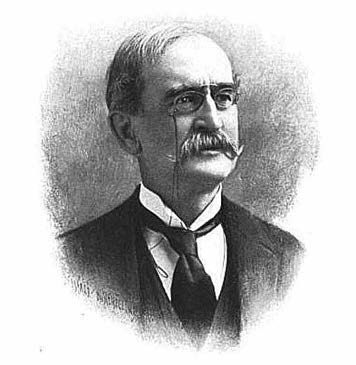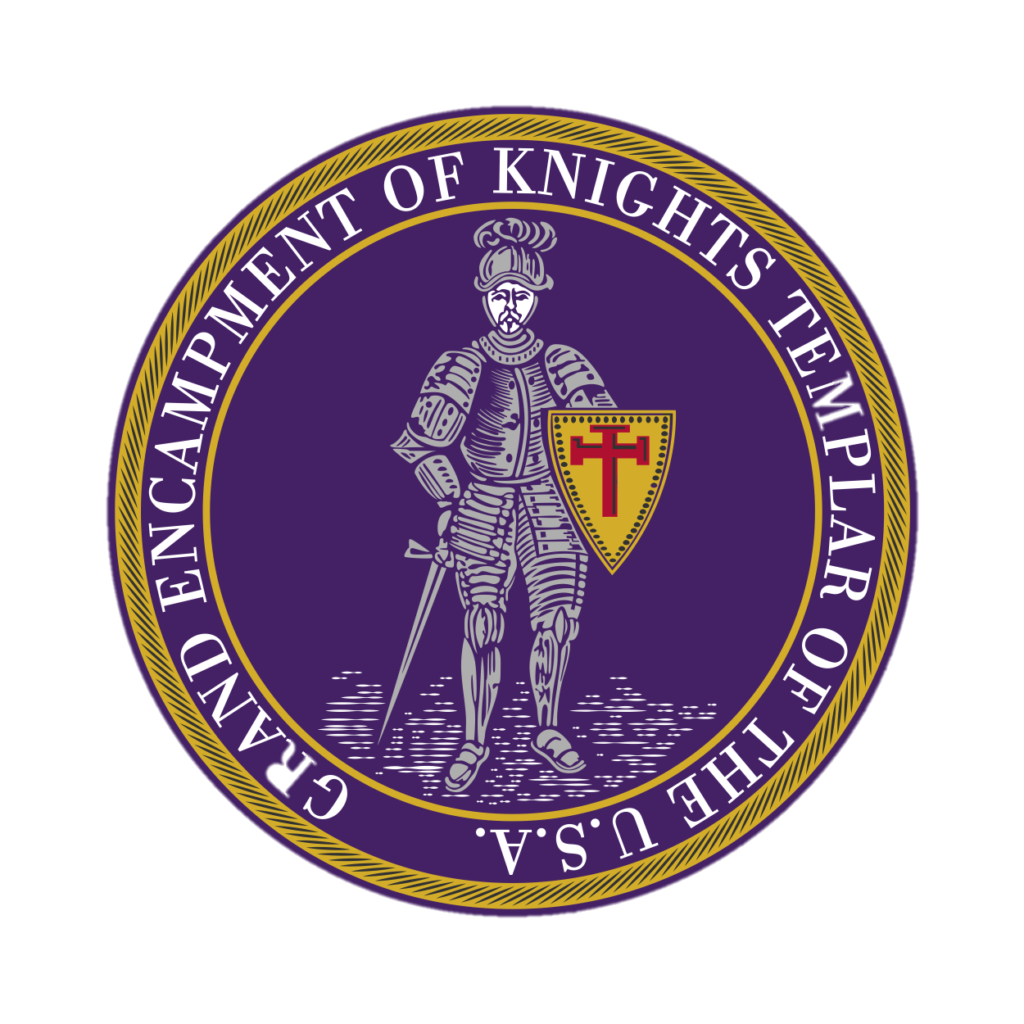Sir Knight James H. Hopkins
Tenth Grand Master of the Grand Encampment
1874-1877
James Herron Hopkins was born in Washington County, Pennsylvania, on November 3, 1832, the son of Colonel William Hopkins (1804-1873) and Rachel [Herron] Hopkins (1803-1886). His siblings were Kate Hopkins (1827-1900) and Andrew Hopkins (1824-1880). His father was a tanner, a member of the Pennsylvania Constitutional Convention, and a Freemason. His grandfather, Thomas Hopkins, served as a private in the 5th Regiment, Maryland Infantry, Continental Service in the American Revolution. He enlisted on February 13, 1780, and was wounded and honorably discharged on November 11, 1780. His family moved to Pennsylvania where he re-enlisted and rose to the rank of major. He was engaged in the Battles of Cowpens and Guilford Court House.
James Hopkins attended the common schools and was graduated from Washington College (now Washington and Jefferson College) in Washington, Pennsylvania in 1850. He studied law, was admitted to the bar in 1852, and practiced in Pittsburgh, Pennsylvania for over twenty years, becoming one of its most prominent members. His health failing, he traveled to Europe and afterward published a volume called Letters from Europe, and later, History of Political Parties in the United States (in 1900). He was also engaged in banking, insurance, manufacturing, and mining. For several years, he served as vice president of the Pittsburgh chamber of commerce.
On October 18, 1871, he married Miss Anna Margaret Schissler (1849-1916) in Frederick County, Maryland. To this union was born three children; Katharine Virginia [Hopkins] Wylie (1872- 1941), James Herron Hopkins, Jr. (1880– 1921), and William Hopkins (??-1922).
He was an unsuccessful candidate for election as a representative from the Pittsburgh District in 1872 to the Fortythird Congress; elected as a democrat to the Forty-fourth Congress (March 4,1875-March 3, 1877); unsuccessful candidate for reelection in 1876 to the Forty-fifth Congress; elected to the Fortyeighth Congress (March 4, 1883-March 3, 1885); chairman, of the House Committee on Labor (Forty-eighth Congress);and an unsuccessful candidate for reelection in 1884 to the Forty-ninth Congress. He introduced the first (successful) bill implementing federal regulations on interstate commerce in 1876. Originally a supporter of such centralized power, the oil lobby led by Standard Oil unsuccessfully fought the measure. “Muckraker” Ida Tarbell cited Hopkins in many of her works and speeches. After his time in Congress, he engaged in the practice of law in Washington, D.C.
Sir Knight Hopkins was made a Master Mason in Franklin Lodge 221 at Pittsburgh on December 4, 1856, and served as worshipful master from 1861 to 1864. He was exalted in Zerubbabel Chapter 162 at Pittsburgh on October 2, 1860, and was high priest in 1867. He was created a Knight Templar in Pittsburgh Commandery 1 at Pittsburgh on April 21, 1862 and became eminent commander in 1866. He was grand commander of the Grand Commandery of Pennsylvania from 1869 to 1870. In the Ancient and Accepted Scottish Rite he received the 32° in Pittsburgh in 1866. He was Illustrious Commanderin-Chief of Pennsylvania Consistory in 1871-72 and was crowned a sovereign grand inspector general 33° on September 19, 1872, at New York.
In 1874 he was elected grand master of the Grand Encampment at the 19th Triennial Conclave held in New Orleans. During his term as grand master, the question of the uniform was not settled, but the ritual for the Order of Malta was adopted. A treaty of amity between the Grand Encampment and the Supreme Templar Bodies of England and Wales was prepared, but the death of the Grand Prior of England and Wales postponed the mutual adoption by both Templar organizations. A resolution adopting the form of the Grand Encampment Past Grand Master’s Jewel was passed. Grand Master Hopkins urged the establishment of a permanent place for holding the business sessions of the Grand Encampment, but this was never adopted.
He died at North Hatley, Quebec, Canada, on June 17, 1904. He had left Washington with his family on May 31st for his summer home at North Hatley. He had been feeling quite well, but unexpectedly suffered an acute attack of “indigestion” which caused his death. The remains were returned to Washington, D.C., where the Knight Templar funeral service was held at his residence on June 21, attended by the officers and past grand commanders of the Grand Commandery of the District of Columbia. The burial service of the Episcopal Church was afterward read by Reverend Sir Knight Alfred Harding. Burial was in Oak Hill Cemetery in Washington, D.C.
Right Eminent Sir Knight Marshall, KYGCH(3), KCT, 33°, is a past grand commander of the Grand Commandery of Knights Templar of Alabama. He is a member of the Editorial Review Board of the Knight Templar magazine and has published several articles in that magazine as well as in the Royal Arch Mason magazine. He can be reached at geomarsh@yahoo.com.
Sources
Francis J. Scully, M.D., History of the Grand Encampment Knights Templar of the United States of America, Wm. Mitchell Co., Greenfield, IN, 1952. Pages 417-419
https://en.wikipedia.org/wiki/James_Herron_Hopkins
http://bioguide.congress.gov/scripts/biodisplay.pl?index=H000775
https://www.findagrave.com/cgi-bin/fg.cgi?page=gr&GSln=hopkins&GSiman=1&GScid=104443&GRid=8484092&
https://www.ancestry.com/genealogy/records/james-herron-hopkins_36944369
https://www.panjury.com/trials/James-Herron-Hopkins
Jan Onofrio, Pennsylvania Biographical Dictionary, 3rd Edition, Vol.1, A-K, Somerset Publ., St. Clair Shores, MI, 1999, page 572.
https://www.ourfamtree.org/browse.php/James-Herron-Hopkins/p406681



